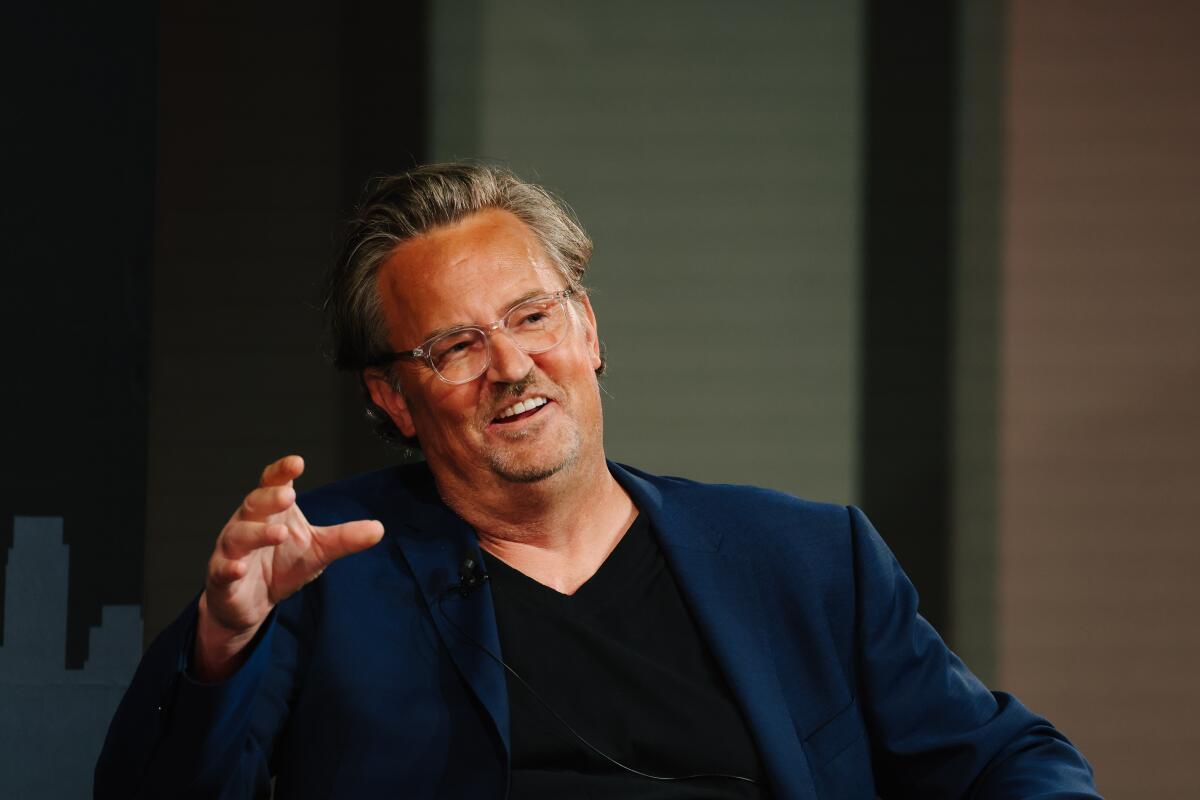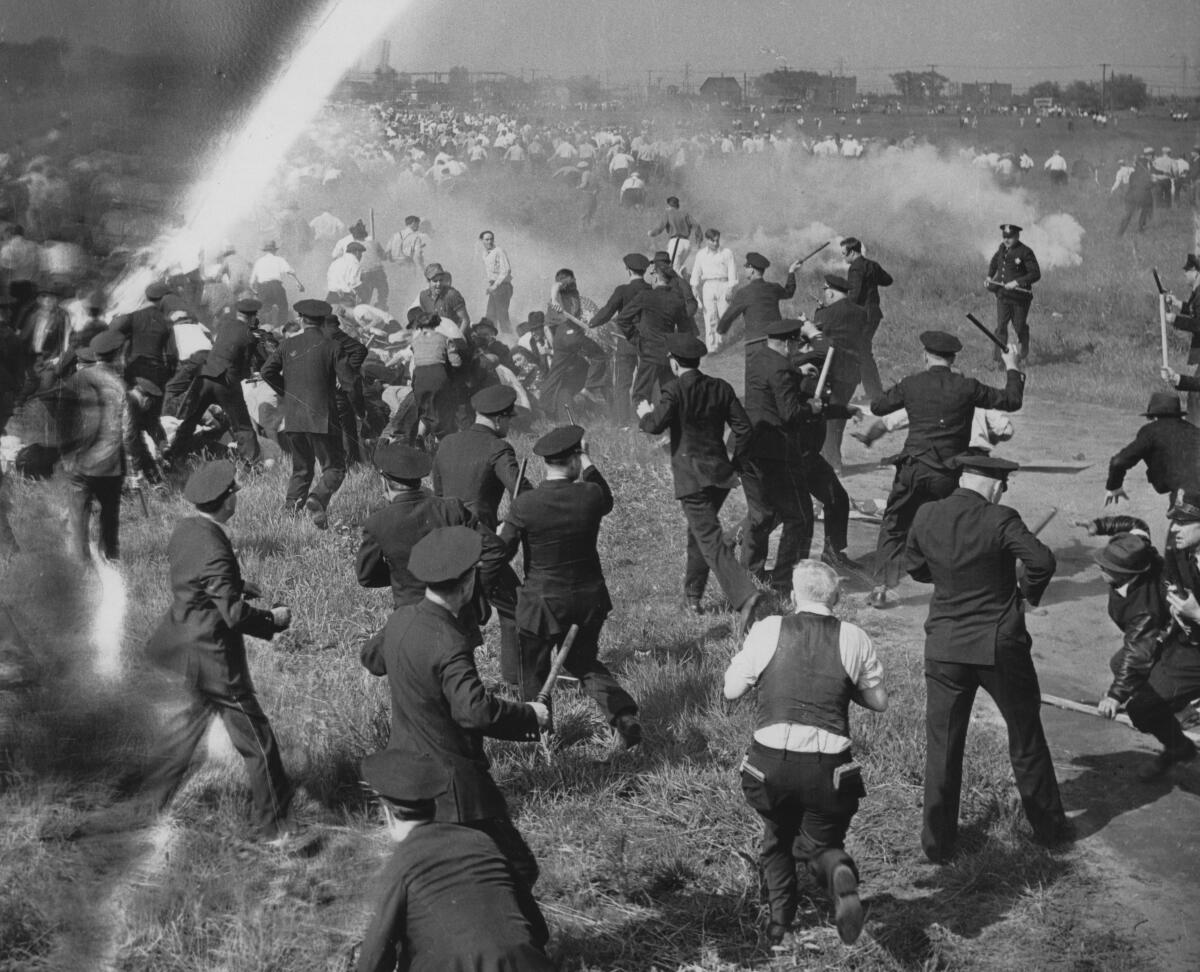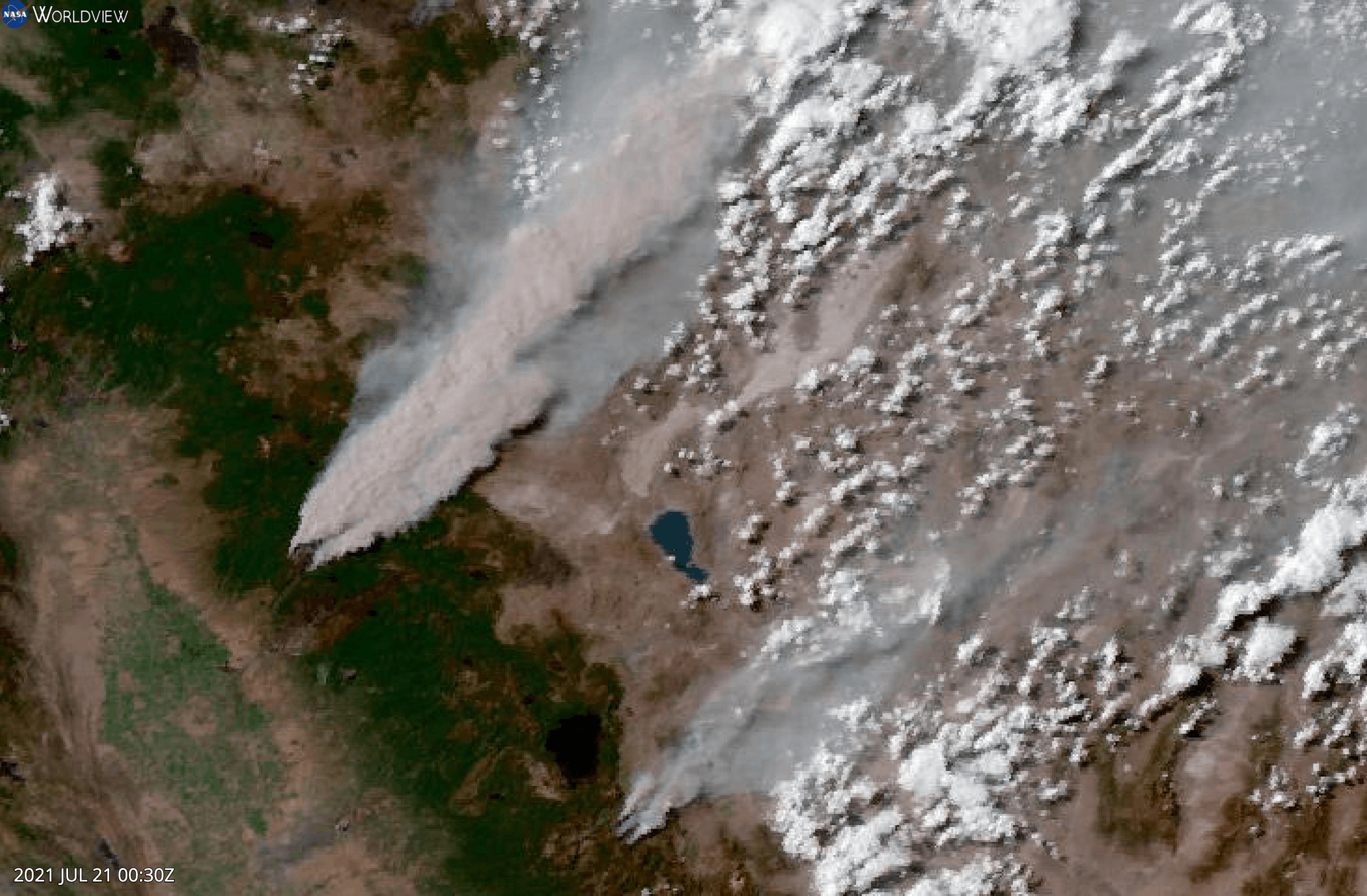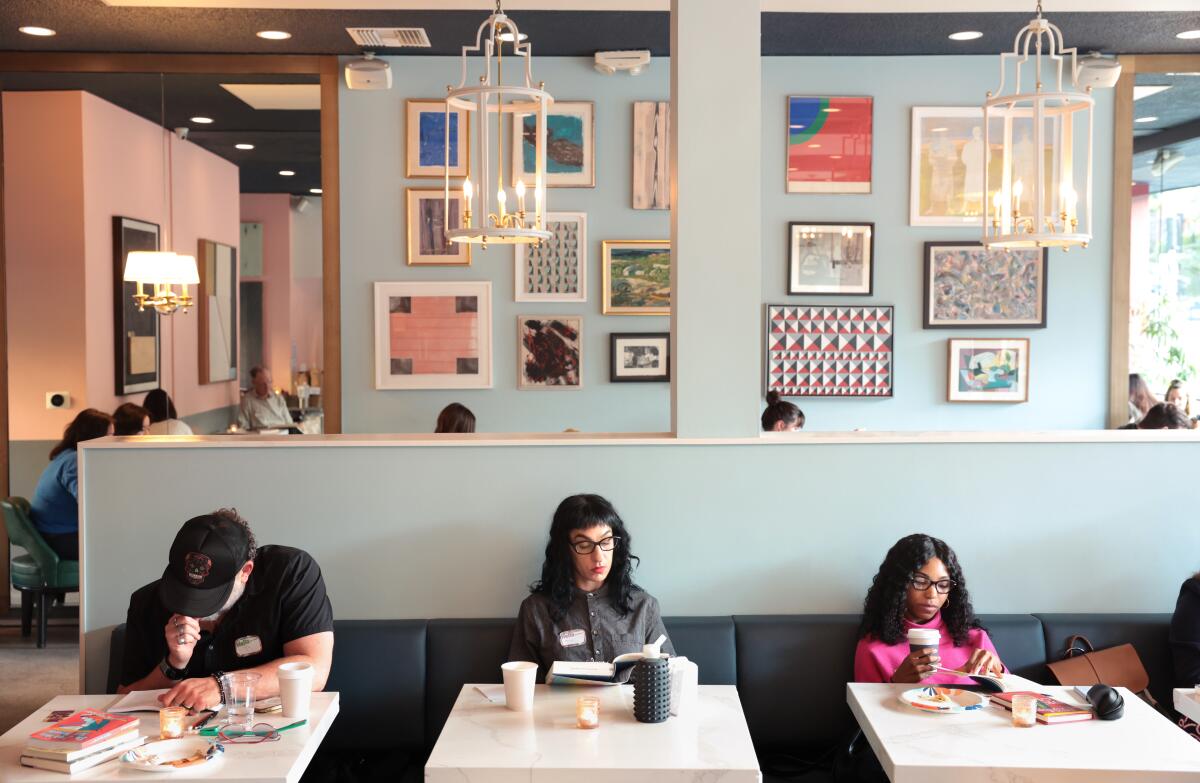The ketamine boom: How the wealthy are getting their hands on the in-demand drug

- Share via
Good morning. It’s Thursday, May 30. Here’s what you need to know to start your day.
- Expensive sessions, a black market and self-prescriptions: How the wealthy are getting their hands on ketamine.
- Witnesses in Sean ‘Diddy’ Combs’ sex-trafficking probe prepare to testify before a grand jury
- The 8 best fabric stores in L.A. to score deals for your next project
- And here’s today’s e-newspaper
You're reading the Essential California newsletter
Our reporters guide you through our biggest news, features and recommendations every morning
You may occasionally receive promotional content from the Los Angeles Times.
What is fueling the ketamine boom?
Mystery surrounded Matthew Perry’s death last year after the “Friends” actor was found dead on Oct. 28 in a hot tub at his Pacific Palisades home. Over a month later, the L.A. County Department of Medical Examiner determined Perry died from acute effects of ketamine.
Ketamine, a drug often used as an anesthetic, was found in Perry’s stomach and bloodstream. Although it is legal in certain forms, ketamine is used recreationally for its hallucinatory effects and off-label to treat mental health issues.

The demand for the drug, especially by the rich and famous who are its newest users, is growing. Medical and law enforcement officials say the wealthy are financing the black market while more prescriptions and specialized clinics are emerging.
My colleagues Salvador Hernandez and Richard Winton reported on the ketamine boom. Here’s what they found.
Clinics and online services galore
According to medical professionals, clinics and online services that offer intravenous treatments and at-home prescriptions — such as nasal sprays and tablets — are fueling ketamine’s new boom.
These services aim to treat substance abuse and psychiatric stress disorders like depression and post-traumatic stress disorder. The sessions are not cheap. A patient can pay from $350 to more than $700 for a single intravenous session or thousands of dollars for packaged treatment sessions.
For instance, at Dr. David Mahjoubi’s Ketamine Healing Clinic of Los Angeles, patients can receive a one-hour ketamine infusion for $700, personally monitored by Mahjoubi. The clinic also offers memberships for six ($2,580) and 12 ($4,650) sessions.
Ketamine infusions were unpopular among the general public in 2014, when Mahjoubi opened his clinic, the board-certified anesthesiologist told the Times. But five years ago, he said, that changed. Demand grew and Mahjoubi opened a second clinic in Orange County in 2022.
Mahjoubi, who is also the president of the American Board of Ketamine Physicians, said he’s worried that some companies are prioritizing profiting off growing demands for the drug, instead of focusing on patients’ health.
“Someone would just open [a clinic] up and stick an untrained nurse in there and have them give [the patient] whatever dose in whatever duration,” he told the Times. “It was quite distressing to see that being done incorrectly.”
Unsupervised use is growing, especially after the pandemic
Ketamine is offered off-label to treat mental health issues like depression. In October, the Food and Drug Administration issued a warning saying it hasn’t approved ketamine’s use for psychiatric disorders and that unmonitored treatments “may put patients at risk for serious adverse events.”
Medical experts also don’t exactly know what the risks of off-label ketamine use are.
“There is little data to support these uses,” said Dr. Caleb Alexander, an epidemiologist and professor at Johns Hopkins Bloomberg School of Public Health. “And it’s a really risky proposition to be using this drug willy-nilly to treat these sorts of conditions.”
The growing use of ketamine, according to Alexander, was exacerbated when the DEA permitted doctors to prescribe controlled medications online in 2020 in response to the COVID-19 pandemic. The rule has since been extended, allowing companies to continue to sell ketamine through online consultations.
“There has been an explosion of ketamine usage with these kinds of online direct-to-consumer marketing practices,” Dr. David Goodman-Meza, an addiction-medicine and infectious-disease specialist at UCLA, told the Times. “If enough people use a drug, you are going to see a certain proportion that is going to start seeing adverse side effects.”
The drug could cause abuse, psychiatric events, increased blood pressure and slowed breathing, according to the FDA. But many suffering from mental health issues, like Lila Ash, have reported feeling lighter and more hopeful after using ketamine, when no other drug or treatment seemed to help.
Self-prescription and the black market
“People are hearing about the medicinal uses for it,” said Bill Bodner, former special agent in charge of the DEA’s Los Angeles field division. “[And] are sort of self-prescribing on the black market.”
Because ketamine has therapeutic usage and doctors still prescribe it, policing the black market which has fueled the demand for ketamine, he said, is extremely difficult. Going after a doctor “would be almost impossible,” he said, unless the prescription had issues, such as hiding the amount prescribed to a patient.
Customs and Border Protection officers seized more than 8,000 pounds of ketamine being carried into the U.S. in the fiscal year 2023. The year prior, CBP officers seized 14,000 pounds and this year, they nabbed 2,500 pounds through April.
Though ketamine was only 0.4% of all 3,220 drug-related deaths in L.A. County for 2022, the most recent data available, medical experts, like Mahjoubi, are concerned its growing use could lead to such serious consequences if clinics and online services aren’t careful in following all medical protocols.
Today’s top stories
Fighting wildfires
- Inside the booming ‘space race’ to launch satellites that help fight the flames.
- A report found that wildfire weather is increasing in California and much of the U.S.
Diddy’s lawsuits
- Witnesses in Sean ‘Diddy’ Combs’ sex-trafficking probe prepare to testify before a grand jury, source says.
- What to know about the Sean ‘Diddy’ Combs lawsuits and raids.
- Sean ‘Diddy’ Combs is accused of ‘four terrifying sexual encounters’ in eighth new lawsuit.
- Cassie says Sean ‘Diddy’ Combs’ violence ‘broke me down’ after assault video surfaces.
Biden v. Trump
- What’s behind the anti-Biden ‘wildfire’ among TikTok influencers?
- Polls say a conviction could cost Trump a fifth of his support. Should we believe them?
Bullets before ballots
- Dozens of Mexican candidates have been killed as cartels seek more control.
- The murder of a presidential candidate in Tijuana 30 years ago still obsesses Mexico
LGBT rights
- Q&A: These researchers examined 20 years of data same-sex marriage. They didn’t find any harms.
- In the ‘gay capital’ of Asia, Chinese LGBTQ+ emigres look to build a new life.
Bronny James and the NBA draft
- Agent says Bronny James is staying in the NBA draft: ‘Lakers need to look at Bronny like everyone else.’
- Bronny James is ready to be himself, but the NBA still sees LeBron James Jr.
More big stories
- Are pet dogs and cats the weak link in bird flu surveillance?
- California could require licenses for stonecutting shops amid deaths of young workers.
- A lawsuit alleges deputy gang ‘shot-caller’ boasted about gruesome death of fleeing suspect.
- Dozens of shuttered 99 Cents Only stores to reopen under a familiar name: Dollar Tree.
- Richard Dreyfuss’ ‘distressing and offensive’ rant has prompted a Massachusetts theater to apologize.
- How Napster created a monster that became bigger than the music industry.
- They bought homes with the intention to refinance. Now they’re stuck.
Get unlimited access to the Los Angeles Times. Subscribe here.
Commentary and opinions
- Doyle McManus: Trump Wins! (One way or another.) Here’s why.
- Jackie Calmes: Red states don’t like ‘Zuckerbucks’ donations? They should pony up more public funds for elections.
- Mary McNamara: Hollywood’s high-pressure expectations game has created a box office doom loop.
- Anita Chabria: Do you care if Trump is guilty? He doesn’t
Today’s great reads
Shhhh. The Silver Lake Reading Club has started. So much of L.A. life is about coming and going, but the readers at one Silver Lake coffee shop inhabit an in-between space where motion has stopped and time is suspended, filled with the wonder, anger, humor and passion of writers: Paul Murray, Thich Nhat Hanh, Kurt Vonnegut, David Sedaris.
Other great reads
- A cult targeted a crusading L.A. lawyer. The weapon: a rattlesnake.
- When is it OK to pick someone else’s fruit tree? We asked and sparked a tense debate.
How can we make this newsletter more useful? Send comments to essentialcalifornia@latimes.com.
For your downtime
Going out
- 🏊🏽This little L.A. city punches way above its weight in terms of cultural impact. It’s also been the unofficial playground of Hollywood since Hollywood began. This must be West Hollywood.
- 🍨 The best desserts in Las Vegas with Cake Boss Buddy Valastro.
- 🧵The 8 best fabric stores in L.A. to score deals for your next project.
Staying in
- 📚Twenty new books you need to read this summer.
- 🧑🍳 Here’s a recipe for oven-baked nachos.
- ✏️ Get our free daily crossword puzzle, sudoku, word search and arcade games.
And finally ... from our archives

On May 30, 1937, Chicago police shot and killed 10 unionists in what has become known as the Memorial Day Massacre.
In a column for the Times, Greg Mitchell wrote about the massacre and how not a single police officer or supervisor was punished for his part in the violence, a fact that often echoes today.
Have a great day, from the Essential California team
Defne Karabatur, fellow
Kevinisha Walker, multiplatform editor and Saturday reporter
Christian Orozco, assistant editor
Karim Doumar, head of newsletters
Check our top stories, topics and the latest articles on latimes.com.
Sign up for Essential California
The most important California stories and recommendations in your inbox every morning.
You may occasionally receive promotional content from the Los Angeles Times.







